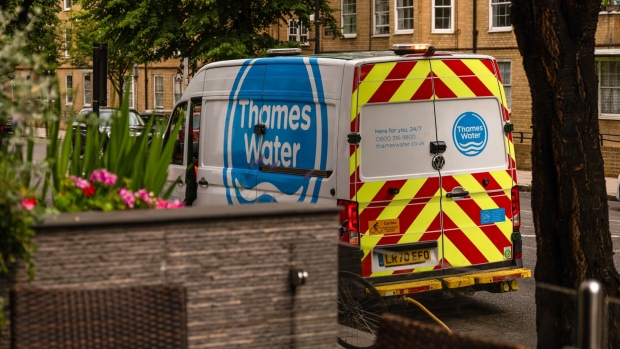Dec 5, 2023
Thames Water Debt Rises as Financing Discussions Continue
, Bloomberg News

(Bloomberg) -- The UK’s biggest water and sewage company is running out of time to convince shareholders it has done enough to warrant receiving an additional £750 million ($946 million) in equity to deliver its turnaround plan.
Thames Water Ltd. on Tuesday reported that its debt pile rose 7% to £14.7 billion in the first half of the financial year as a result of soaring inflation. Scrutiny over the stability of its financing structure recently forced the utility to slim down a program seeking to improve its performance.
Thames provides water to millions of households in London and surrounding areas, and is regarded as too big to fail. Earlier this year, Chief Executive Officer Sarah Bentley abruptly resigned and the government was put on standby to take the business into temporary public ownership amid fears of a financial collapse. Auditors have reported that Thames Water’s parent company, Kemble Water Holdings, may run out of money by April if shareholders don’t inject more equity.
The owners, largely infrastructure funds, provided £500 million of new funding in March and promised £750 million of new equity by the end of 2025, subject to certain conditions. Industry regulator Ofwat has indicated that shareholders will need to provide another £2.5 billion between 2025 and 2030.
Acting Co-CEO Cathryn Ross said the board is preparing to appoint a new leader in the “fairly near future.”
She added the company’s leadership hopes for an early signal of support from Ofwat for a five-year investment plan it submitted in October, in which it proposes spending £18.7 billion on upgrading its aging networks, tackling pollution and fixing leaky pipes. Ofwat’s final evaluation isn’t expected until this time next year, and will be a crucial foundation for shareholders.
Alastair Cochran, the other acting CEO, said the board has assumed on paper that a first £500 million tranche will come in March 2024, and a final £250 million in March 2025.
He also said Thames Water is “entirely ring-fenced” from Kemble, and not directly impacted by the auditor’s report. Cochran refuted reports from last week that a £500 million cash injection from the company’s owners earlier this year was actually a loan charging 8% annual interest.
On Tuesday, members on Parliament’s Environment, Food and Rural Affairs Committee said they have asked Thames Water representatives to give evidence to them on Dec. 12, following reports last week about financial arrangements.
Thames Water’s gearing, a crucial measure of the ratio of debt to equity, fell marginally to 79.5% compared with 80% a year ago. It’s still one of the highest levels in the sector and higher than the 77.4% that it reported in July. Revenue was up 11% compared with last year at £1.2 billion, the company said.
Paul Vickars, a credit analyst at Bloomberg Intelligence, said Thames faces the risk of refinancing a £190 million Kemble Water loan in April, “which threatens its going-concern status.” Kemble Water relies on dividends from the operating company, which could face pressure if Thames Water doesn’t get firm commitment on additional equity, he said.
In October, Thames said bills will need to rise by 40% to help fund its five-year investment plan to 2030. That has drawn ire from customers who are critical of Thames’s poor record on sewage spills and leakage. Ross said bills could ultimately be higher or lower than the proposed 40% hike, depending on Ofwat’s final determination.
“We might get asked to do more, in which case — other things being equal — bills would be higher,” she said, adding that the turnaround plan “will take time” and involve “tough choices.”
(Updates with details on parliamentary hearing in ninth paragraph)
©2023 Bloomberg L.P.








